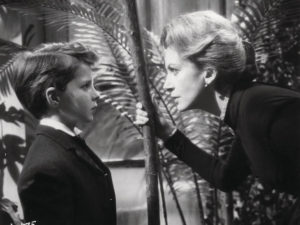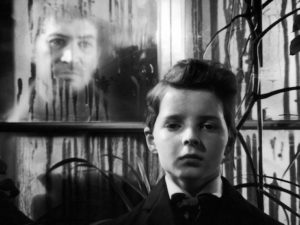 Many an eerie film has been described as a “spine-tingling” experience, but few live up to that description literally for most cineastes. The movie that did that to me more than any other, giving me physical shivers like a bucket of ice down my back, is this week’s film recommendation: The Innocents.
Many an eerie film has been described as a “spine-tingling” experience, but few live up to that description literally for most cineastes. The movie that did that to me more than any other, giving me physical shivers like a bucket of ice down my back, is this week’s film recommendation: The Innocents.
Producer/Director Richard Clayton’s 1961 art house thriller demonstrates that a skilled director can jangle nerves without spattering the screen with blood. Clayton started with ideal source material: Henry James’ psychological horror masterpiece, The Turn of the Screw (Although the film’s title comes from William Archibald’s prior effort to adapt the novel to the stage). But Clayton was wise enough to bring in a modern master, Truman Capote, to write most of the script. Capote kept the best elements of the Victorian English novel and suffused them with Freudian overtones and a dose of American Southern Gothic, rotting blossoms and all.
The plot sounds deceptively unoriginal on the surface. A wealthy man uninterested in two child relations (Michael Redgrave) hires a sheltered, rather jejune woman (Deborah Kerr) to be their governess. She moves in to care for them in a Gothic mansion, and the children at first seem wonderful. But strange passions and mysterious events arise which plunge the woman into a terrifying experience. The film, like the novel, leaves the central question of the plot a matter of some ambiguity, making it almost as enjoyable to analyze and discuss as it is to watch.
I don’t know how the 40-year old Deborah Kerr was cast as the lead in this film (unless her governess role in The King and I typecast her), because James’ governess character was originally conceived as a naive woman barely into adulthood who had never been away from home before. Yet Kerr turns in one of the best performances of her storied career, steadily unraveling before our eyes. To the extent the film is interpreted as portraying the psychologically deleterious effects of loneliness and sexual frustration, a 40-year virgin gave Kerr lots of material with which to work her magic.
Astonishingly, the veteran Kerr is matched step for step by the riveting acting of a 12-year old, Martin Stephens. He was already a star in Britain, based in part on his similarly unnerving turn in Village of the Damned. His role here is even more challenging because not only does he need to mix childlike moments with menacing ones, he also has to convey sexual awareness well beyond his years. He manages it all brilliantly.
This is also an amazing looking film, with the gardens and house exteriors (Sheffield Park), and the custom built interior sets contributing to the atmosphere. Even more important is the camerawork of superstar cinematographer Freddie Francis. From the very first shot, he pulls off an impressive array of visual feats, including blackening the edges of many of his interior shots to create a claustrophobic effect, as well amping up the central lighting when needed to get depth of field shots in CinemaScope’s otherwise flat look. Without spoiling the movie, I will just offer that the images from the most frightening scenes of The Innocents have stayed with me forever.
This movie didn’t quite land with audiences or critics when it was released. It was too arty and reserved for fans of more typical horror films of the period, and too traditionally haunted house bound for the arty set. I’m not going to embed the trailer for this reason, because all it does is show that even a major studio with a big promotions department could not figure out how to effectively market The Innocents. Fortunately, as magnificent films sometimes can do, The Innocents gained a larger and larger following as the years went by, until today it deservedly wins a place on virtually every “best horror films of all time” list.

I watched this upon your recommendation, and it’s excellent, as good as Deborah Kerr has ever been, creepy and atmospheric. The kids do a fine job, too. It’s free, public domain, on YouTube. Really good. Thanks for the tip!
I am delighted that you sought it out and enjoyed it.